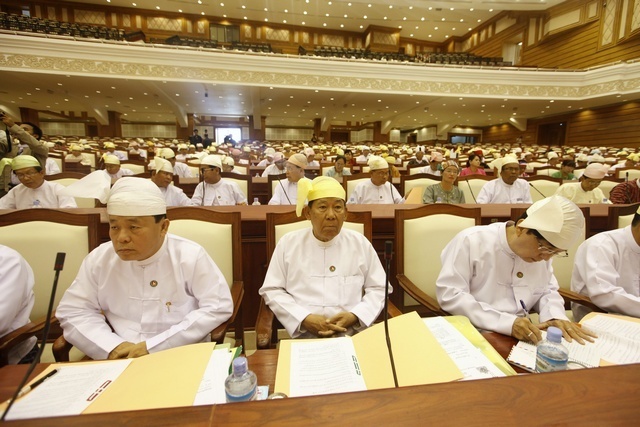The lower house of Burma’s parliament accepted a proposal on Thursday to formally debate changing the country’s current electoral system to a proportional representation (PR) system, which proponents say will better reflect Burma’s ethnic diversity.
However, several ethnic political parties are staunchly against switching the current first-past-the-post system (FPTP) and dozens of parliamentarians boycotted Thursday’s session by not attending.
The Nationalities Brotherhood Federation (NBF), an alliance of 11 ethnic political parties, had previously voiced strong objections against the PR system, believing that it would disadvantage ethnic political parties, as they will not be able to feasibly win support from all over the country.
With many of its opponents absent from Thursday’s session, the lower house approved a formal debate for a PR electoral system. Only 45 parliamentarians present voted against the proposal.
Before the parliament went into session on Thursday, Sai Thiha Kyaw, a lower house MP from the Shan Nationalities Democratic Party (SNDP) and a member of the NBF, said that all 20 SNDP parliamentarians abstained from attending.
“We, the [ethnic] political parties, have objected to the PR system both vocally and via press statements, because it is still too early for our country to use the system, and that even if it is to go ahead, it should not be employed in ethnic minority areas,” Sai Thiha Kyaw said. “Despite our objections, we are seeing a relentless effort to push it through the parliament. In a show of our objection, many ethnic MPs are choosing not to attend the session today.”
He added that MPs from other NBF members — including from Chin, Arakan, Karen and Mon parties – also did not attend the session.
[related]
Sai Pao Nat, an upper house parliamentarian from the Wa Democratic Party, said that should the PR system be approved by the bicameral parliament, real issues faced by Burma’s vast ethnic populations will never see the light of day.
“There will be so many disadvantages for us. If the PR system goes through, voices from our ethnic populations will never reach the parliament,” said Sai Pao Nat. “No one will ever hear about the issues and developments from the Wa region.”
The opposition National League for Democracy party are also against switching the country to a PR electoral system, arguing that such a voting process is “not currently relevant” in the political arena.



